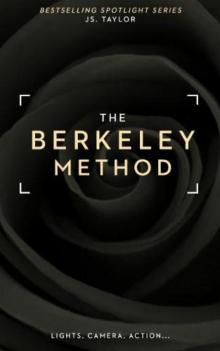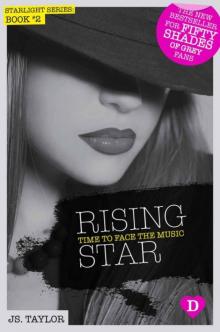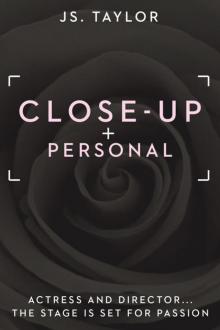Close Up and Personal (Spotlight Series) Read online
Page 2
He’s dressed plainly in the classic director’s black jeans and T-shirt. I’ve seen this look a hundred times in drama school. But clinging to his broad chest and muscular thighs they take on a new level of sexy.
He’s so hot. The though leaps into my head unbidden.
There’s a rustle of paper as he consults his notes.
“Isabella Green?” he says. The corner of his mouth twitches, just fractionally.
“Yes.”
“And you are auditioning for Lady Capulet?” He sounds confused.
I let out a breath.
“Yes.”
“I apologise for the last minute change in who you were expecting. Nancy has been called away,” he says, his tone explanatory.
The words compute in my brain. Nancy. Nancy Mendes. The casting director. He’s explaining why he’s here instead of her.
“She’s having some… personal problems, and so I offered to step in,” he adds. “Nancy is a good friend of mine.”
She must be a very good friend if he flew here all the way from LA. I wonder idly what his wife must think of her famous husband jetting halfway across the world to help out a female friend.
“You know who I am?” he asks.
His accent is aristocratic English, I realise – something I hadn’t noticed in the nerves of my first arrival. He speaks in the definite tones of the British upper class.
I nod, fractionally. Of course I know who you are! My brain screams.
Every drama student knows about the famous producer-director and his equally famous actress wife.
“Your first film became a cult classic,” I mumble, consulting my student knowledge bank, “and it made you the youngest director to win an Oscar for Best Picture. Then your next three films became huge box office hits.”
He gives a slight smile, as if amused to see his work summarised.
“Quite so. Thank you for the biography,” he agrees in clipped tones, and I can’t tell if he’s flattered or horrified by my childish description of his career. But something about the tone of his answer goads me.
“You’re also notorious for pushing actors to their limits,” I retort, “and the rumour is that you’re known as ‘the hammer’ on-set, for your work-all-hours approach.”
I regret the words almost as soon as they are out of my mouth.
Damn my Spanish hot-headedness. Will I ever learn?
Berkeley’s eyebrows raise and my sudden rush of courage deserts me.
I stare at him nervously, trying to gauge the effect of my last remark. He seems completely unconcerned.
“The actors who complain of the work do not complain when they win awards,” he says, without emotion.
It’s as much as I can do to concentrate on why I’m here, and I realise I’m staring at his mouth. I’ve seen James Berkeley in pictures. Everyone has. But in real life the seductive charm he oozes in pictures is dialled up to the next level.
“I didn’t realise you had such an interest in theatre,” I stumble, filling the silence with the first thing which comes into my head.
He looks surprised.
“I have an interest in all dramatic arts,” he says. “Some of my interests are more financial than hands-on. But that doesn’t mean I don’t find the time to be personally involved when my movie schedule allows.”
He sounds annoyed.
Great start Isabella.
“Well then,” he says, his accent rounding off every word. “You’d better show me what you can do.”
Something about the way he says it suggests he finds the idea funny.
He can already see I shouldn’t be here. The thought brings a white surge of panic to my stomach and I fight to push it down.
Get out the lines, do your best, and get out of here. I say to myself. It’s the best I can hope for.
I walk to the centre of the stage. My script is in my hand because that’s what’s expected at an audition. But I don’t need it. I’ve learned everything by heart.
The part I’ve rehearsed is Lady Capulet’s biggest scene. Where she tells Juliet she must marry a man she doesn’t love.
I close my mind for a moment and try to let the character flow.
Then I take a deep breath and begin. But I’ve only uttered a few lines when Berkeley stops me.
“You’re not using your script,” he says.
I swing to face him, totally wrong-footed in the middle of my performance.
“I. Um. I’ve learned it by heart,” I say.
He gives a sardonic smile. “How very diligent.”
Great. So James Berkeley doesn’t like me. He could at least have the manners to let me finish my performance.
Trying not to let his disapproval put me off I carry on for a few more lines. But after a moment he interrupts again.
“What do you think Lady Capulet is feeling at this moment?” he asks.
I stare at him in confusion. But this at least is something I can answer.
“She’s thinks her domineering husband might do something terrible to Juliet,” I say. “She loves her daughter. But she realises that it is best for Juliet if she marries Paris instead of Romeo.”
“You don’t think that Lady Capulet has her own selfish motives?”
The script in my hand is shaking a little, but I still myself.
“No,” I say, defending my own reading of the play. “That’s not how I read it. I think she’s doing the best to protect her daughter in a difficult situation”
“I see.” His voice is crisp, and I realise I have blown it. This must be what the life of an actor is like, I think grimly. I should have known it wasn’t for me. The rejection comes like a sharp jab in the pit of my stomach.
“What made you decide to audition as Lady Capulet?” he asks, more kindly now. I realise he’s breaking the news that I’m not right for the part.
“My friend Lorna put me forward,” I admit.
I have nothing to lose now so I might as well tell the truth. It’s obvious I have no right to be here anyway. “She chose the role,” I add.
Berkeley frowns.
I lower my script and stare at the ground.
“Thank you for your consideration,” I say. To my embarrassment the words come out choked. There are tears in my eyes.
“Wait.” The authority in his voice echoes around the small room and stops me in my tracks as I make to leave the stage area.
Berkeley is on his feet. He moves towards me, and suddenly there are two players on the stage. James Berkeley and me.
Whoa. It’s almost too much to take in.
He is so close I can smell his cologne. It is a musky, heady smell. I have to stop myself consciously breathing him in.
“I liked your reading of Lady Capulet,” he says. “You brought a dimension to her I hadn’t seen before.”
I feel a flush of pleasure. He liked my performance. Then reality kicks in. Get a hold of yourself Isabella. That doesn’t mean he wants to cast a nobody.
Up close I can see his features in far greater detail. Photographs in the press have not done him justice. His features are perfect, as though he has been sketched by an artist. But they have just the slightest unevenness about them, giving him a roguish look. The combination is heart-stoppingly sexy.
“Let me read with you,” he says, stepping a little closer.
I realise I am holding my breath. He must know the effect he has on women. I am staring at his mouth again and flick my eyes away. The knowledge brings with it a slow blush, and I try to pick a non-sexual feature to focus on.
But wherever my gaze rests brings a new part of his perfect face into detail. Deep green eyes. Heavy eyebrows. Chiselled cheek-bones. I settle on the space above his sculpted nose and hope the blush isn’t showing on my cheeks.
“I think you are miscast as Lady Capulet,” he says. He is staring at me intently. “Do you know Juliet’s lines in this scene?”
I nod dumbly. Of course. I learned both roles. You need to do that to understand th
e character.
Berkeley nods. He seems impressed. “Quite the professional you are,” he says.
I flush again. He’s mocking me.
“Well then,” he says, “let’s see whether you understand an innocent Juliet as well as you play the misunderstood Lady Capulet.”
Juliet! I’ve never played a main character.
“I’m not sure I’m ready for Juliet,” I mumble. “I’ve never played a main role.”
I raise my eyes to meet his and as I catch his dark expression I look quickly back to the floor. “I’ve only played bit parts,” I add, wincing at the confession. Surely he’ll throw me out now? What kind of person turns up to an audition at a major theatre having never played a main role?
“You’re not ready for Juliet?” he murmurs. I hear amusement in his voice, but can’t bring myself to look up off the floor.
“But is Juliet ready for you?” he says.
This confuses me enough to raise my gaze, and I see a part-smile lighting his features in a devilish cast.
“You will read Juliet,” he snaps, his voice suddenly drained of humour. “And I will read Lord Capulet.”
This must be what it’s like to work with James Berkeley, I think, wincing at the severity of his tone.
I look down at the script distractedly. And suddenly his fingers close around it.
“Let’s do without these shall we?” he says, tugging the script free from my hands. “Better we go naked, since you’ve learned the part.”
It’s a theatre term I’ve heard hundreds of times. It means acting without a script. But for some reason when he says it has a different meaning. I have a sudden image of us both naked on the stage. I wonder what he looks like beneath his black director’s jeans and T-shirt. I blush crimson.
Berkeley drops both scripts on the floor.
“I know every line in Romeo and Juliet,” he says, in answer to my unspoken question. “We shall begin on line 2225.”
I glance at the script.
2225. Juliet. My line.
I’ve spoken these words before, in my bedroom, and tried to imagine what it must feel like to be Juliet – hopelessly in love, but forced to submit to marry where she doesn’t love. I open my mouth and the words come out.
“Not proud you have, but thankful,” I begin, staring up into his face.
It’s hard not to look away, but I hold his gaze. “But I beseech you, I can never marry where I hate.”
The words bring with them the character and I gratefully tumble into the role of Juliet, letting the theatre and James Berkeley melt into the play.
“You shall marry Paris,” says Berkeley, and the anger in his voice comes off him in waves.
Holy hell. He can really act.
I have never read lines with someone so accomplished before. His anger seems so real it scares me deeper into character.
I drop to my knees for the next line, staring up at him. His fury feels overwhelming, and I am begging it to subside.
“Sir,” I say, “I beseech you on my knees.”
Something else is in his eyes now. Am I imagining it?
He looks like he wants to devour me.
“You are mine,” he growls, “and as mine I give you to my friend. And if you are not mine I leave you to starve and beg in the streets.”
As he speaks the words I feel something stirring within me. My body feels hot and my breath is tight in my chest. Is this what they mean by chemistry on stage?
“Is there no pity in you Sir?” I plead, my voice thick with desperation. I stand, and swept up in the act I place my hands flat on his chest in a gesture of supplication. The contact brings with it an electric shock and suddenly I am Isabella again, staring up at his hard green eyes.
For a second he too seems to have broken character, and is gazing into my face. Then the anger loads back into his features.
I swallow and Juliet returns. “That sees the bottom of my grief?” I conclude, taking away my hands and moving them to cover my mouth.
Instead of answering Berkeley turns and makes a few paces away from me. He seems to be lost in his own thoughts. I realise the act is over.
My body is only just catching up with my mind. It’s swirling with a depth of emotion that I’ve never felt before. The proximity to Berkeley was overwhelming and even though he’s only stepped a few feet away I feel as though I’ve been severed.
Then the waves of disappointment begin to wash over me. He stopped the scene so quickly. I wasn’t good enough then, after all.
“That was very interesting,” he says finally, as though reading my thoughts.
Interesting. Great.
I stand awkwardly, embarrassment flooding back now that I’m Isabella again, alone in a theatre with James Berkeley.
He turns to me. “There is something about your acting,” he says, and then he stops.
I stare dumbly back at him wondering what he means.
“I usually find people easy to read, easy to place,” he mutters, staring at me. “But you. You are a mystery. I have no idea what character might bring out the best in you.”
He looks genuinely distressed, and I wonder if this is some artist insecurity. But somehow I don’t think so. I can’t imagine James Berkeley is ever usually uncertain.
“We have already cast Juliet to a known actress,” he says, “and I am not sure that would be your part in any case.”
In a sudden movement he is back in his chair, looking at his watch.
“I’ve let this audition overrun,” he says. “Not something I have ever done before,” he adds, almost to himself.
I realise he is dismissing me.
“Thank you for your consideration,” I say, picking the script up off the floor. I make to hand it back to him as I leave, but he gestures I should keep it.
“The casting decision is not made for six months,” he says. “You will hear whether you were successful then.”
I nod, and walk out of the audition room, finally making sense of what’s just happened.
I’ve had an audition with James Berkeley. He was generous enough to try me out for a different kind of role in the play. And I disappointed him after a few lines.
The thought is so unexpectedly painful that a few tears come to my eyes.
I hastily brush them away, furious with myself.
Toughen up Isabella. I growl at myself as I leave the theatre. You wanted to try your luck at acting. You just got what you deserved.
Chapter 4
I make my way home on the underground in a daze. James Berkeley. And he said he liked my acting.
This at least brings a little surge of glee to salve the disappointment of messing up the audition.
I get of the underground in Chelsea, the London district where Lorna and I share an apartment. My phone beeps in my pocket. I’ve missed three calls from my mother since I’ve been travelling under London’s busy streets.
I press to return the call, and just as I think she’s not going to pick up the phone answers.
“Darling!” My mother’s Spanish accent sounds warmly.
“Hello Mami.”
“Darling I had a feeling something might be wrong.”
“No Mami. I had the audition I told you about.” This is typical of my mother. She has a sixth sense for when I’m in emotional turmoil.
“How exciting darling! When will you hear back?”
“Six months.”
My mother ponders this. “That is a long time. Did you do well?”
“I don’t think so. The producer was doing the casting. It was intimidating.”
“Oh darling, I will never know why you think so little of yourself. I am sure you were magnificent carino.”
I smile. Carino is Spanish for darling, and my mother uses it often.
“How are you doing for money Isabella?”
“Fine. I still have the waitressing job. It’s good enough money.”
I hear a deep sigh at the end of the line.
“I
am so sorry Isabella. When your father left you his apartment in Chelsea he wanted it to be a blessing. And now it is a curse because of these legal vultures.”
I am laughing a little. “Don’t be so dramatic Mami.”
“I will never understand it,” she continues. I can almost see her brows knitting on the other end of the phone. “Why is it so complicated?”
“It’s not that complicated Mami,” I sigh. “Dad left the apartment to me when he died. But the building comes with a service charge. To cover the upkeep of the building.”
“But why is it so much carino? It is thousands of pounds.”
“Mami I’ve told you this a hundred times. Chelsea is a really expensive part of London. People who live here are millionaires. They expect to pay a lot in service charges.”
The annual fee is so high that Lorna and I wind up paying the same in service charge as we would renting in another part of the city. But we have a much nicer apartment and the location is perfect for Lorna’s modelling work and West End theatres.
“I promise I will manage the legal things,” says my mother.
I have heard this before. If she could bring herself to deal with the lawyers, the apartment can be negotiated service-free. But my mother never could stomach legal papers.
“I do it this month,” she promises. I know she won’t, and I don’t have the heart to force the issue.
“Ok Mami,” I say, “but it’s fine really. The service charge is the same as rent,” I repeat, “and we’re the only drama graduates I know who have a doorman in a fancy hat.”
My mother laughs.
“Ok darling,” she says. “Listen, I’m going to come to London to visit you in a few days. I go now. You take care. I love you.”
“Ok. See you soon then. Love you too Mami.”
I hang-up, mentally tidying the flat of Lorna’s clothes for my mother’s visit. My early childhood was spent travelling in a VW with my parents’ puppet show, and my mother is the last person to care about a little mess. But I always like to make sure the apartment is nice for when she comes.
I’m at the door of my apartment block now, and Peter the doorman opens the door. I smile. Peter has been doing this job for twenty years and we often share a joke. He knows I’m the only person in the entire block besides Lorna who doesn’t have a Porsche and a trust fund.

 The Director's Cut
The Director's Cut The Berkeley Method
The Berkeley Method Rising Star
Rising Star Close Up and Personal (Spotlight Series)
Close Up and Personal (Spotlight Series) The Final Act (#4 Bestselling Spotlight Series)
The Final Act (#4 Bestselling Spotlight Series)